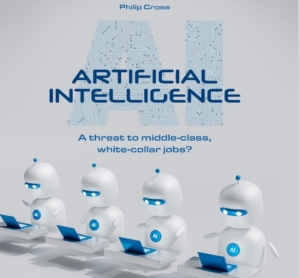ATINER: “Artificial Intelligence and Labor Market Effects”


Inspired by a paper recently released by the Macdonald-Laurier Institute (20230831_Artificial-Intelligence-Cross_PAPER.pdf (macdonaldlaurier.ca), ATINER would like to organize a roundtable discussion on “Artificial Intelligence and Labor Market Effects“. This roundtable discussion will be organized by ATINER’s Business, Economics and Law Division (www.atiner.gr/blrd) (Director: Dr. Michael P. Malloy, Distinguished Professor & Scholar, University of the Pacific, USA) as part of the 17th Annual International Conference on Global Studies: Business, Economic, Political, Social and Cultural Aspects (18-21 December 2023), Athens, Greece (www.atiner.gr/cbc).
Dr. Gregory T. Papanikos, President, Athens Institute for Education and Research (ATINER)
Artificial intelligence (AI) is emerging as the most discussed technological, social, and economic phenomenon of 2023. But many people are concerned that if it proves to be an improvement over human intelligence, AI will significantly reduce the demand for labour, especially for middle-class jobs.
This paper looks at the possible economic impacts of AI. It makes no attempt to forecast how AI will evolve and does not address broader concerns about whether
the capabilities of AI will outrun the ability of humans to understand and manage this technology. Rather, it examines the economic impact of AI so far and compares its evolution with past forecasts of how technological change would affect workers. It cautions against a rush to increase government regulations and spending based on as yet unfounded concerns about the impact of AI on jobs.
Machine automation has been feared for its impact on human jobs since the Industrial Revolution began. Earlier eras of automation disrupted employment patterns in farming and factories, but overall job growth actually accelerated as higher incomes drove the expansion of other industries. Despite that experience, there are numerous forecasts that the deployment of AI will lead to widespread job losses.
Compounding the anxiety of potential job losses is the fear that AI will displace middle-class jobs and that the rewards from the widespread deployment of AI will accrue to a small number of people who own the capital and will thereby increase inequality.
The reality is that recent developments in the labour market are the exact opposite of these gloomy predictions. Employment rates are at an all-time high. The main difficulty of employers is finding workers in a labour market where unemployment is near historic lows. While AI technology was predicted to be a unique threat to white collar jobs, white collar employment in Canada, the US, and Britain continues to increase steadily. This raises the possibility that AI will be deployed to help workers do their jobs better – not to get rid of employees.
More: Philip Cross, “Artificial Intelligence”
